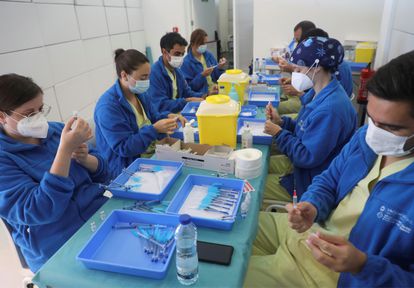My Covid-19 vaccine is due when I’m on vacation: Will I be able to get my shot while away from home?
The Spanish government’s chief epidemiologist and the Health Ministry both opened the door to this possibility this week. But while some regions are already offering such an option, others are ruling it out
/cloudfront-eu-central-1.images.arcpublishing.com/prisa/L5PHALVQ3NDNJOXYX7A5VJFDG4.jpg)

The summer season is fast approaching in Spain, meaning that thousands of Spaniards will soon be traveling to other regions in the country for their vacations. The imminent movement has prompted a new debate: should citizens be able to get their Covid-19 vaccine shots while away from home?
Fernando Simón, the director of the Health Ministry’s Coordination Center for Health Alerts (CCAES), opened the door to this possibility earlier in the week. But when questioned by EL PAÍS, the Health Ministry would only refer to the national strategy, which specifies that the vaccine will be injected where people “are currently residing.” That’s to say, where they are registered on the local padrón (municipal roll) and have their local healthcare center.
However, a ministry spokesperson added: “We are working on a document for specific exceptional cases,” without specifying what these are nor how an eventual change in vaccination location would work.
Experts argue that the logistics of the vaccination campaign could become more complicated, but they admit that such an option is viable
Some regions, such as Andalusia, Cantabria and Valencia, are planning to allow for this option, while others, such as the Basque Country, have so far not made provisions for it. For their part, experts disagree on whether or not it is convenient. They argue that the logistics of the vaccination campaign could become more complicated, but they admit that such an option is viable.
The regional health chief in Valencia, Ana Barceló, has revealed that tourists resident in other regions are already receiving their second dose, provided that they have applied for a temporary local health card. This option is regularly taken up by many people who spend the summer in the region, and in fact there are healthcare centers that open specifically for these citizens.

Barceló has called, however, for the Health Ministry to establish criteria so that the process is reciprocated, and has also requested that there be compensation between the number of doses the region receives and the number of doses administered to people from other regions.
Andalusia, meanwhile, has stated that it is studying the possibility of vaccinating summer visitors in its region, but has not explained how the mechanism for giving these people appointments would work. According to a spokesperson, the decision is pending debate in the central Health Commission and the Inter-Territorial Council of the National Health System (CISNS), which brings together the central Health Ministry and the regions.
The Balearic Islands have announced they are studying the possibility of vaccinating people summering in their territory, but with conditions. “It must happen hand-in-hand with the ministry, in an official manner, and ensuring that these vaccines arrive,” said Juli Fuster, the general director of the Balearics’ health service.
According to the experts, the distribution of vaccine doses will be one of the elements that complicates this process. Right now, vaccines are distributed according to the number of residents in a region, based on data from the National Statistics Institute.
Anything that facilitates people getting their vaccine is good. There shouldn’t be any obstaclesAmós García, president of the Spanish Vaccinology Association
Daniel López-Acuña, a former director of emergencies at the World Health Organization (WHO), sees more complications than advantages to the idea. “Opening the doors to vaccinating in another region would involve logistical problems of data comparison, leaving people potentially in limbo, as well as presenting difficulties if there is a high volume of displaced persons… We are overcomplicating things.”
Spain is currently focusing on the 40-to-49 age group in its vaccination campaign. This is the biggest segment of the population, counting on eight million people. The summer vacation season is likely to start with the first and second doses of the vaccine being administered to this collective, and then moving on to the over-30s. According to government calculations, 16.7 million people aged 25 to 49 will have to be vaccinated before the summer is finished. The problem is that vacations could interrupt this process, above all due to the risk that people are given appointments in the middle of their trips and they are far from their usual residence.
“In the current context, the idea is to vaccinate as many people as possible,” argues Amós García, the president of the Spanish Vaccinology Association. “Anything that facilitates people getting their vaccine is good. There shouldn’t be any obstacles.”
Cantabria is another region that is in favor of vaccinating visitors. “Whoever has had a vaccine dose and is here, well, they can get [the second dose] here,” said Miguel Ángel Revilla, the regional premier. “They will be called from the primary healthcare center wherever they are. They will have to communicate the date they got their first dose, and in the allotted time, and in the appropriate healthcare center, they will be vaccinated,” he explained.
‘Vacations not the priority’
The Basque Country, meanwhile, is taking a different approach, and has committed to “guaranteeing the vaccination of the people who live here,” in the words of Gotzone Sagardui, the regional health chief. She added that residents who cancel their appointments due to clashes with vacations will have to wait until they are given a new appointment. She also stated that this issue will have to be debated by the ministry and the regions. “The priority is to continue with the immunization process, not vacations,” she said.
Amós García, meanwhile, considers the proposal to be “logistically viable.” “The distribution of doses can be readjusted and I don’t think this will involve too many people,” he argued. “In the Balearic and Canary Islands there may be more demand, but this can be remedied.” After all, the Spanish national health system is available to Spanish citizens in any location when they need it.
With reporting by Mikel Ormazabal, Lucía Bohórquez, Javier Martín-Arroyo and María Fabra.
English version by Simon Hunter.
/cloudfront-eu-central-1.images.arcpublishing.com/prisa/ZNRM2ZAGUPKUXJJO7AGFBKX2UI.jpg)
/cloudfront-eu-central-1.images.arcpublishing.com/prisa/BV4FFBBQZVAPLIUUCUWTAR6MQE.jpg)










































